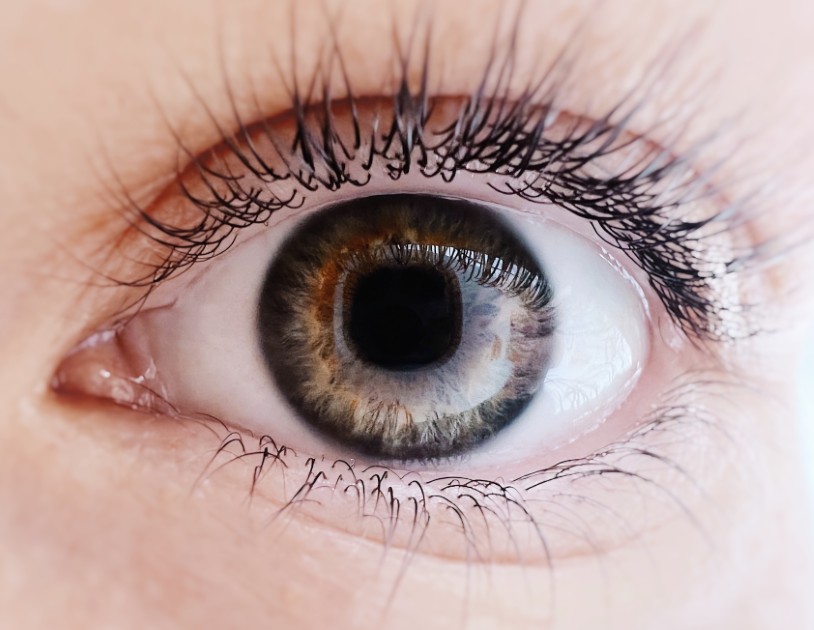Ever heard the saying, “the eyes are the window to the soul”? It turns out your eyes might also be a window into something more tangible – your biological age. In other words, the condition of your eyes could reflect how quickly your body is aging. Scientists have long observed that people of the same age don’t always feel or function the same; some 60-year-olds have the vitality of someone much younger, while others show signs of aging early modernretina.com. Now, cutting-edge research suggests that a simple look into your eyes could help measure these differences. Recent studies indicate that ocular biomarkers – measurable features in the eye – can reveal important clues about your health, longevity, and how fast you’re aging.
Eyes: A Window to Your Biological Age
When you get an eye exam, the doctor isn’t just checking how well you can see. They’re also peering at tiny blood vessels and nerves in the back of your eye (the retina) that can reflect the state of your overall health. In fact, doctors have recognized for years that changes in the retina’s micro blood vessels often signal broader health issues like high blood pressure, heart disease, or diabetes, sciencedaily.com. In essence, the eyes provide an accessible snapshot of your body’s circulatory system – one you can literally look into without any invasive procedures. As Dr. Marie Pigeyre of McMaster University explains, “changes in the retinal blood vessels often mirror changes occurring throughout the body’s small vessels”. These eye-based signs (ocular biomarkers) are becoming a key focus for researchers studying aging because they’re visible, non-invasive, and packed with information about our vascular and nervous systems.
One reason the eyes are so revelatory is that the retina (the light-sensitive layer at the back of the eye) shares characteristics with other vital tissues in the body. The retina’s network of capillaries and cells can be affected by the same processes that drive aging elsewhere – things like oxidative stress (wear and tear at the cellular level), accumulation of damage, and inflammation. In fact, inflammation is emerging as a critical link between eye changes and aging. Researchers often refer to “inflammaging” – the chronic, low-grade inflammation that builds up as we age – as a major driver of age-related damage. This shows up in the eyes too. For example, certain inflammatory proteins have been found in higher levels alongside retinal changes, suggesting that the immune system’s simmering fire might be singeing our eye tissues as we get older. The good news is that these insights don’t just explain aging – they might also point to solutions. The McMaster University team identified specific molecules (like a protein called MMP12) involved in retinal aging, and they see them as promising targets for future drugs to slow vascular aging, sciencedaily.com. In other words, by studying how your eyes age, scientists hope to discover how to slow down aging in the rest of your body.
New Research: Retinal Scans Reveal Aging Speed
A recent study published in Science Advances (October 2025) has put a spotlight on just how much our eyes can say about aging sciencedaily.com. Researchers at McMaster University analyzed retinal scans from over 74,000 people (from large health studies in Canada, the UK, and elsewhere) and compared those images with genetic data and blood biomarkers. This massive, data-driven approach led to a striking discovery: people whose retinal blood vessels were simpler and less branched tended to be aging faster than their peers. In the study, individuals with these less complex retinal vessels had a higher risk of cardiovascular disease and showed biological signs of accelerated aging – such as higher levels of inflammation in the blood and even a shorter projected lifespan. In contrast, people with rich, branching networks of tiny eye vessels generally fared better.
Why does the pattern of vessels in your eye matter? Think of your retinal blood vessels as a mini reflection of your body’s capillaries and arteries. If those vessels in your eye are narrowing or losing branches, it might indicate similar aging changes in other parts of the body (like the heart, brain, or kidneys). The study’s senior author noted that by linking eye scans with genetics and blood tests, they were able to uncover molecular pathways connecting retinal aging with overall vascular aging. This is a big deal: it means scientists are not just observing a correlation (like “old-looking eyes mean an old-looking body”), but also beginning to understand why that correlation exists. It appears that aging, genetics, and lifestyle factors converge on the eyes, making them a rich source of health data.
Crucially, this 2025 study suggests a future where a simple eye scan could become part of your routine health check-up. The researchers envision that doctors might use quick, non-invasive retinal scans to assess your biological age and cardiovascular health – almost like getting your blood pressure checked, but for aging. Spotting signs of accelerated aging in the eyes could alert you and your healthcare provider to underlying issues years before traditional symptoms arise. For example, if an eye scan reveals that your retinal vessels look older than expected for your age, it might prompt early interventions (like managing blood pressure, improving diet, or other preventive measures) to protect your heart and brain. This could be transformational, because today many age-related conditions – heart disease, stroke, dementia – require multiple complex tests to evaluate sciencedaily.com. In the future, retinal imaging might serve as an easy first step to flag individuals who need closer monitoring or aggressive prevention. (To be clear, doctors would still confirm findings with other tests – but the eye scan could be an early warning system.)
Pro Tip: Make sure you’re getting routine comprehensive eye exams. An optometrist or ophthalmologist can spot subtle changes in your retinal blood vessels. These visits aren’t just about vision – they’re about catching health clues early. Your eyes might quietly reveal issues like hypertension or diabetes before you notice any other symptoms, giving you a head start on addressing them.
Retinal Age Gap: Your Eyes vs. Your Years
Perhaps the most fascinating development in ocular aging research is the concept of the “retinal age gap.” This refers to the difference between the biological age of your retina and your actual chronological age modernretina.com. In simple terms, if a 60-year-old’s eyes have the hallmarks we’d normally see in an average 65-year-old, that person has a retinal age 5 years older than their real age – a positive retinal age gap. If instead their eyes look more like those of a typical 55-year-old, they have a negative retinal age gap (their eyes appear younger than their actual age). Research shows this gap is more than just a number – it can predict health outcomes.
A 2022 study of nearly 47,000 middle-aged and older adults in the UK used AI to estimate retinal age from eye photographs at modernretina.com. Amazingly, the AI could guess a person’s age from a retina image with about 3.5 years of accuracy on average. But the real payoff came from looking at the outliers – those whose retinas looked much older or younger than expected. Over about 11 years of follow-up, participants with “older” eyes (a larger retinal age gap) had substantially higher risks of dying compared to those whose eyes matched their age. Specifically, if your retina were a year older than you, your risk of death from any cause would go up by about 2%. And people with very old-looking eyes (for example, 5–10 years older than their actual age) had a 49% to 67% higher risk of death from causes other than heart disease or cancer. Those are startling numbers – they suggest that the age of your eyes is capturing something fundamental about your body’s resilience and health.
Researchers concluded that retinal age is a strong independent biomarker of aging. Even after accounting for factors like blood pressure, smoking, or diabetes, the eye’s age gap still predicted who was more likely to get ill or die sooner. It appears that the cumulative damage of aging – think of it as the “mileage” on your body – is very much evident in the eyes, and it correlates with similar wear and tear in vital organs. This is why scientists are so excited: the retina offers a unique and accessible window into the body’s internal aging process. And it’s not just about longevity. Other studies have linked retinal age gaps to higher risk of specific diseases, like stroke and kidney disease, modernretina.com. Essentially, if your eyes are aging faster, it could mean your kidneys, brain, or heart are under strain as well.
On the flip side, a “young” retina for your age is a positive sign. It might reflect a healthier lifestyle or good genes that are keeping your vessels and nerves in better shape. This raises interesting possibilities: could we monitor retinal age as we try to improve our health? For instance, if someone adopts a healthier diet, exercises, or takes medication to control blood pressure, will their retinal age gap shrink over time? Research is ongoing, but one day we might use the eyes not just to predict problems, but to track improvements in our biological age as we make positive changes.
Keeping an Eye on Your Health and Aging
The idea that your eyes can reveal how fast you’re aging is both intriguing and empowering. It means that paying attention to eye health isn’t only about preventing blindness or getting glasses – it’s about your whole body. Here are some practical steps to leverage this insight:
- Stay up-to-date with eye exams: Regular eye examinations (including retinal imaging when recommended) can detect early signs of systemic aging and disease. An eye doctor might spot high blood pressure, diabetes, or other issues in your retina before they cause symptoms, sciencedaily.com. Early detection gives you a chance to intervene and protect your health.
- Manage your risk factors: What’s good for your heart is good for your eyes. Keep your blood pressure, blood sugar, and cholesterol in check – through diet, exercise, and medications if needed. Healthy lifestyle choices will slow the aging of your blood vessels, including the ones in your eyes. Think of each jog or salad as polishing the “window” into your body.
- Watch for changes and act: If you notice changes in your vision or eyes (blurriness, floaters, or anything unusual), don’t ignore them. Sometimes, subtle eye changes can be the first sign of an aging-related condition. Prompt check-ups can catch issues early when they’re most treatable.
- Embrace new technology: Be open to emerging health tech. In the near future, your annual physical might include a quick retina scan along with blood tests. These innovations aim to help you age smarter – catching problems early and tailoring health advice to your personal biological age. Staying informed about such tools means you can take advantage as they become available.
In conclusion, your eyes do more than see – they reflect the story of your health. From the branching of your retinal vessels to the glow of your lens, they record the passage of time and the wear of life’s journey. The exciting part is that science is learning to read this story in detail. By combining AI, genetics, and big data, researchers are decoding the language of our eyes to gauge how fast we’re ticking inside. The takeaway for all of us is motivating: take care of your eyes, and they’ll help take care of you. Simple steps like protecting your eyes from UV light, avoiding smoking (which accelerates eye and vascular aging), and eating nutrient-rich foods (leafy greens, Omega-3s) can support eye health – and by extension, overall health.
Finally, remember that knowledge is power. Knowing that your eyes can reveal changes in your body’s aging process is a reminder to be proactive. You have tools at your disposal – from medical check-ups to healthy habits – that can influence how gracefully you age. So the next time you look in the mirror, notice your eyes and take it as a friendly nudge. Are you giving your body what it needs to age well? Your eyes might quietly hold the answer, and with the help of science, we’re learning how to listen.






